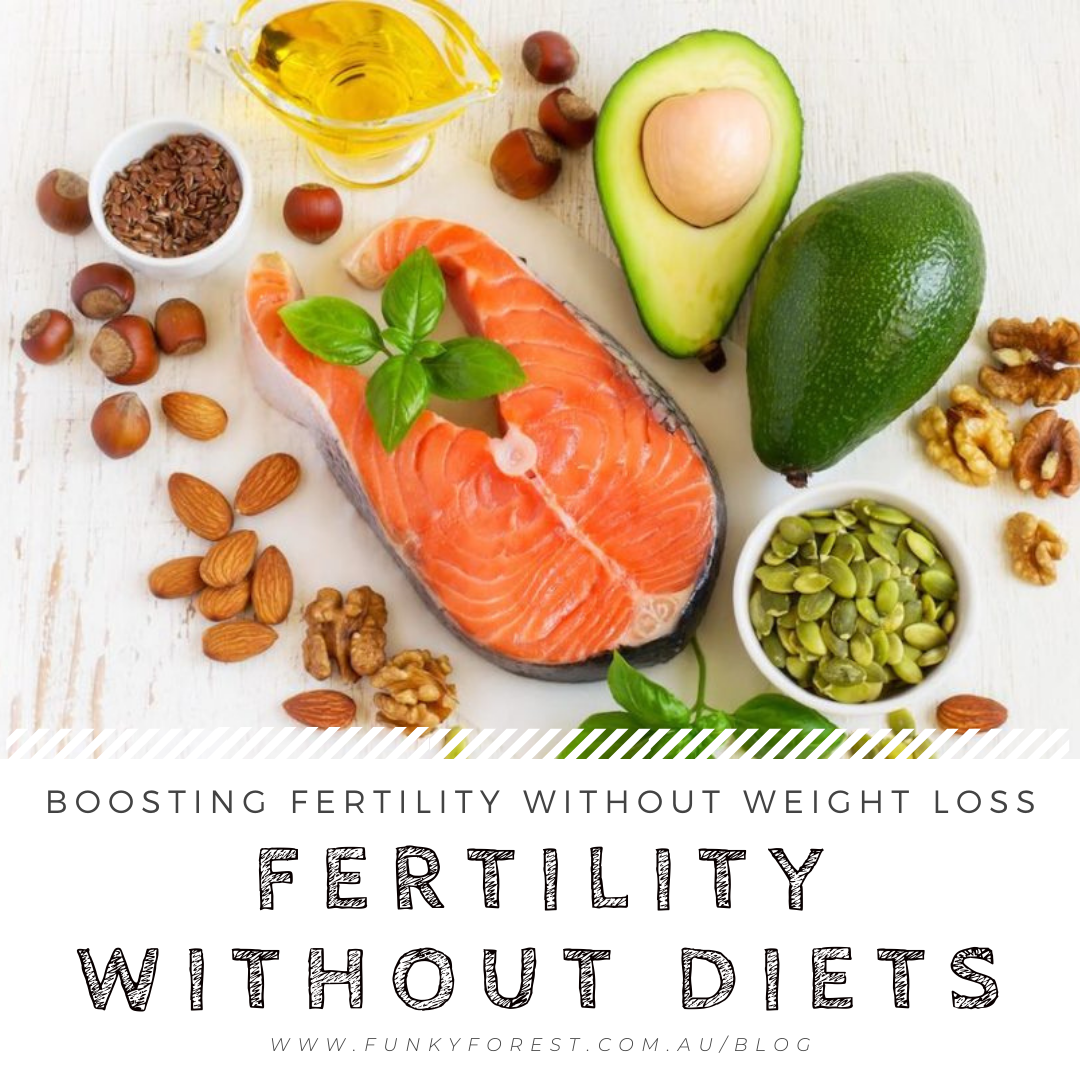Whilst some women shy away from telling people about their conception plans, I'm a massive over-sharer with an excitable soul! So what better way to revise my fertility nutrition basics in preparation for polishing up my own baby making equipment, than to share this information with you too.
I figure that since I've now had one kid, I have a little bit more personal experience to refer to than I did a couple of years ago, BC (before child).
Nowadays, I also have more professional experience working with women of all sizes who have worked with me to improve their fertility - some "overweight", some "normal weight", some a little "underweight" as far as medical BMI ranges go - and nearly all have been able to fall pregnant by focussing exclusively on their HEALTH.
This experience flies in the face of the advice of many doctors, scientists, and health professionals that "overweight people just need to lose weight" in order to fall pregnant.
So before we dive into my fertility boosting essentials that I work on with clients who wish to conceive, it's really important that you understand one important thing. This is so important that it's actually the first of the fertility-boosting tips I want to discuss. To fall pregnant, you must...
1. focus on health, not weight
I've conversed with a number of healthy larger-bodied mums and wannabe mums, and their experiences seeking fertility health advice are nothing short of disappointing. It goes something like this:
Usually, they've had some kind of brief encounter with a GP who has handed them an infuriatingly simplified factsheet explaining that "with a healthy eating plan (i.e. a diet) and regular exercise (i.e. torturous movement for the sole purpose of burning fat), you’ll be on your way to a HEALTHY WEIGHT (whatever the fuck that means!)".
In short, the focus for larger-bodied women wishing to fall pregnant is too often placed on optimising weight, not health. This is not only medical weight bias. It's also just plain wrong.
The number of women I see torturing themselves with 12-week weight loss challenges, meal-replacement shakes, and/or some other form of restrictive dieting after receiving aforementioned medical advice, is both staggering and heartbreaking. And the worst thing is, even if they do manage to temporarily lose weight through these avenues, the hard-won weight loss often fails to bring about the pregnancy they so desperately want, and it's unsustainable to boot.
And now they're hungry, nutritionally depleted (the opposite to what you want going into pregnancy) and tired, too.
Born breeders & Yellow teeth
- more locally, seasonally grown, nutrient-dense, and home cooked organic food (in those days, simply known as 'food')
- more time spent doing necessary manual labour (now known as 'exercise')
- more hours spent working outdoors getting sun exposure for vitamin D production (which is critical for fertility)
- less exposure to environmental toxins
- less encouragement from diet culture to fuck with and unnecessarily restrict her diet causing potential nutrient deficiencies, energy deficiencies, and mental health issues, and
- a far greater sense of family and community than most of us enjoy nowadays.
These are all things that very likely impact health in a positive way.
By today's (ludicrous) beauty standards, going by the above photograph my GG's body shape would be considered robust at the very least, and if we're honest, overweight or fat by many. Had she visited a typical modern day GP or other non-HAES health professional, chances are she would have had the "lose weight... and here's a shitty handout" experience.
But in my GG's day, I'm pretty sure her body shape was NOT seen as an impediment to having babies. Quite the opposite. Rather, the strong, robust, wide-hipped, large-breasted body type my great-grandmother had was the height of fecundity. It was known as a birthing body. In short, she was "overweight", AND she was also fertile and healthy AF.
In the words of my late grandad - her son, "she was a born breeder." Forgetting for a moment the sexist connotations of that comment, it illustrates the fact that back in the day when pregnancy was a physiological state that women had far more trouble avoiding than they did bringing about, fatness or higher body weight was not the scapegoat for infertility that it is today.
So why the spiel and shitty handouts? Well, it's mostly because of those studies showing that high body weight is associated with infertility. But like so many other studies investigating weight and health, the link between weight and fertility in these studies is one of correlation, not causation.
Obesity is said to affect fertility by "causing hormonal imbalances and problems with ovulation" (my emphasis). Obesity is indeed associated with polycystic ovarian syndrome (PCOS), a common hormonal cause of infertility affecting up to one in five women of reproductive age. But is it the cause?
Here's why I think it is not:
PCOS does not exclusively affect overweight women, but women in the "normal" weight range as well. I've seen PCOS in very lean athletic women, and even "underweight" women. This suggests that obesity may not be the cause of PCOS at all, but rather correlated with it.
Although correlation with weight does NOT imply causation by weight in illnesses like diabetes, heart disease, and infertility, the implication is that certain health markers improve as a direct result of weight loss, which is a misunderstanding.
Mistakenly, the credit for improvement in the health marker in question (be it improved blood sugar regulation, lower cholesterol, or improved ovulation or conception rate) is placed on the weight loss rather than the actual health-promoting behaviours that may have simply had the infamously celebrated side effect of weight loss.
Body positivity activist, Isabel Foxen Duke puts it beautifully when she says this:
“People who have diabetes often have more fat on their bodies,”
just like, “people who have lung cancer often have more yellow teeth.”
Yellow teeth do not cause lung cancer. But smoking may increase your risk of both.
Fat on the body does not cause diabetes. But poor blood sugar regulation may increase your risk of both."
Health researcher, Linda Bacon, says in her most recent book, Body Respect,
that "telling someone to lose weight to manage their diabetes is a lot like telling someone to whiten their teeth to manage their emphysema - it misses the point, and might not even help if the actual root cause of such illness is not addressed."
This is why liposuction probably won’t cure your diabetes or improve your fertility - it doesn’t address the actual cause of diabetes or infertility, which is not necessarily body fat, but rather, poor blood sugar control or hormonal dysregulation - which can be due to many other factors besides body fat.
The difference between correlation and causation is the important thing to get here.
A closer look at those studies
These behavioural changes and the associated improvements in biochemical markers were associated with concurrent weight loss. This means that the weight loss may have merely been a side effect, an artifact, rather than the cause of improved health markers. Yet the weight loss is celebrated as the ticket to improved fertility and makes the headlines, rather than the behavioural changes that lead to improved health overall.
But I suppose, behaviour change is far less marketable than weight loss. It's a lot harder to patent a drug for health-promoting behaviour change, than it is to market a weight loss wonder pill.
**By the way, this study (n=6) used a reduced calorie diet to bring about weight loss but it only went for 12 weeks - which is about how long such a diet could be humanely tolerated by an individual before the inevitable backlash binge. Twelve weeks is no where near long enough to track the long term impact of weight loss on fertility (1-2 years would be an improvement), and whether or not that weight loss (and the markers it supposedly improved) was sustainable. In this case, since the weight reduction was brought about by reducing calories i.e. restrictive dieting rather than client-centred nutrition counselling and the resulting healthy behaviour change over a longer period of time, I hypothesise that the weight loss was not sustained. Always look at the timeline for these kinds of studies: it's almost always super short so as to highlight the "benefits" of weight loss before the weight inevitably comes back on!
The conclusions drawn from these studies are deceivingly over-simplified, which explains those shitty handouts. It's a shame, because there is useful information in these studies. It's at the interpretation phase that things go awry.
From this 1998 study: "...weight loss should be considered as a first option for women who are infertile and overweight."
Or this 1995 study: "Thus, weight loss with a resultant improvement in ovulation, pregnancy outcome, self-esteem and endocrine parameters is the first therapeutic option for women who are infertile and overweight."
Um, how about implementing behavioural change therapy as the first therapeutic option? Whilst this kind of research is somewhat useful (especially if it were used to prompt more specific research into the impact of health-behaviour change on biochemical markers and disease state), the dumbed-down conclusions made from these studies that then go on to make news headlines, are not.
Promoting weight loss as the first therapeutic intervention to treat infertility is like saying, "teeth whitening should be the first therapeutic option in the treatment of lung cancer"!
Do you see the correlation vs causation thing at play here? Good.
The improvement in fertility seen in these studies could just as easily be due to improved antioxidant status and resultant decrease in inflammatory markers from increased intake of fruit and vegetables, i.e a behaviour change with the side effect of weight loss. Or from improved insulin sensitivity brought about by exercise - another behaviour change - rather than from any weight loss said exercise had as a side effect of improved insulin sensitivity.
Highlighting weight loss as a primary therapeutic option is misleading at best, and harmful at worst. It's bad enough when researchers make twisted conclusions from their own research. But then when health providers try to distill practical applications for their patients from these studies whilst looking through a weight loss-centric lens, weight loss as panacea is an easy though misguided conclusion to make. The media also plays a HUGE part by selling headlines off the backs of these studies - everyone knows that the weight loss rhetoric sells.
So the woman wishing to get pregnant hears lose weight! from every corner of the arena, whilst missing out on the correlation/causation thing.
Without context or scientific literacy, and in the weight-centric climate our medical and social systems are steeped in, weight loss is what people cling to. And that often means weight loss at any cost, including by restrictive dieting.
And when weight loss at any cost is emphasised over behaviour change, it's little wonder that I get women with PCOS coming in to see me who want to be put on a strict low-carb paleo diet or even Optifast (!) just to bring about the weight loss which will "magically make them fertile".
Worse, I've also had normal weight women with PCOS coming in, wanting to be put on said diets to lose weight, just because of the association of "obesity" with PCOS! Go figure that out...
The same situation applies if a woman in a larger body is told that her higher body weight increases the risk of pregnancy complications and health problems for the baby. Once again, we need to focus on the HEALTH of the mother, rather than her weight. These feared pregnancy complications are risks associated with obesity, but again, are yet to be proven to be caused by obesity. (I would argue that scaring the mother into changing something as uncontrollable as body weight would actually cause more unnecessary stress that would potentially damage her and her baby.)
Could it not be just as (if not far more) plausible to speculate that a woman's health behaviours (including smoking or drug-taking status, eating behaviours (which encompass both WHAT she eats and HOW she eats - with the HOW frequently dictating the WHAT), movement habits, socioeconomic status, stress levels, mental health etc) are just as (if not far more) predictive for the risks of health problems purportedly increased by obesity, like miscarriage, hypertension, pre-eclampsia, gestational diabetes, infection, blood clotting, need for induction of labour, Caesarean birth and stillbirth?
Put another way... if weight loss WERE the simple key to improving fertility... why not just lose weight by crash dieting, undergoing chemotherapy treatment, or cutting off a limb? Clearly, these things are not going to improve fertility, although they will pretty much guarantee weight loss (even if only temporarily, in the case of dieting).
There is Another way
Why? Because a healthy body is usually a fertile body, too - no matter what shape or size that body happens to be. Of course, full respect is given here to people with fertility issues that are due to certain structural or genetic conditions, for which improved nutrition, stress management may need to be in adjunct to surgery and/or fertility technologies.
Ok, now that that's out of the way, I can dive into the actual health behaviours that women and men of ALL shapes and sizes can focus on to improve their odds of conceiving. The following key areas (featured in part 2 of this blog) are crucial points of consideration for anyone looking to maximise their chances of not only falling pregnant, but of also having a healthy, full term pregnancy, non-eventful labour and birth, and solid postpartum period, and if you intend to breastfeed, an easier time doing that, too.
You can read the other fertility must-knows in part 2, here.




































 RSS Feed
RSS Feed



